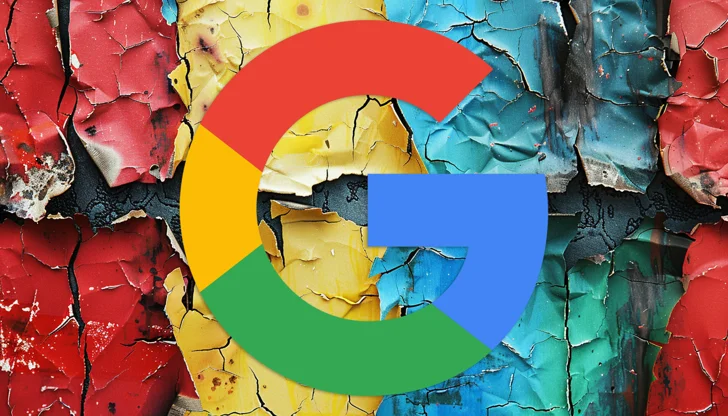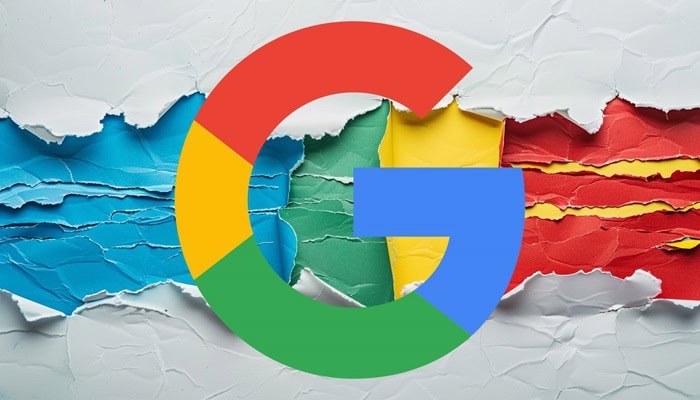Google’s SearchLiaison took to Twitter to address a speculative tweet pondering the potential effectiveness of a specific tactic for navigating the Helpful Content Update system. Offering insights, SearchLiaison expressed reservations about the suggested approach.
It was evident from SearchLiaison’s tweet that he aimed not to criticize Lily Ray in any way.
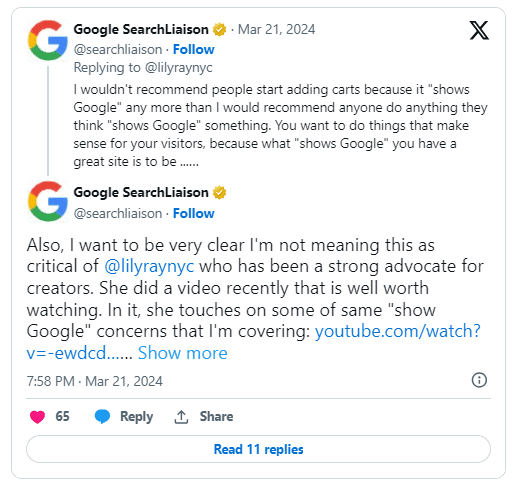
Later on, Lily tweeted an update clarifying her previous statement, with a snippet provided below.
“Since my original tweet apparently requires clarification, there, I updated it. 😅But yeah, in case anyone was unclear, I am not suggesting that adding an ecommerce store is some kind of magic bullet that will solve HCU issues. Those don’t exist.
My actual point was that expanding into ecommerce is something that could potentially add value for your users (assuming it’s actually a high-quality store with products they would enjoy) and can help USERS feel more of a connection and trust with your brand. It also gives your website more of a purpose beyond just recommending products sold on other peoples’ sites.”
SearchLiaison engaged with Lily Ray’s observation regarding the correlation between websites affected by the September 2023 Reviews update and the current March Core Algorithm update. To fully grasp SearchLiaison’s response, it’s essential to consider the broader context, as a superficial reading may not capture the entirety of the discussion. Lily pointed out that the discussed sites consist of more than mere content; they also included an e-commerce aspect.
Her tweet read:
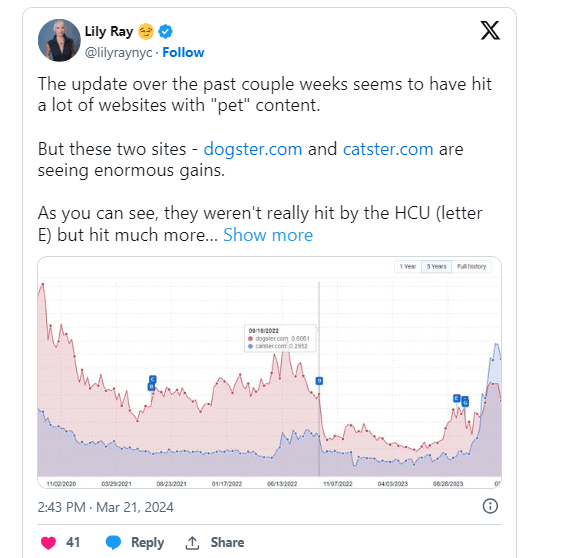
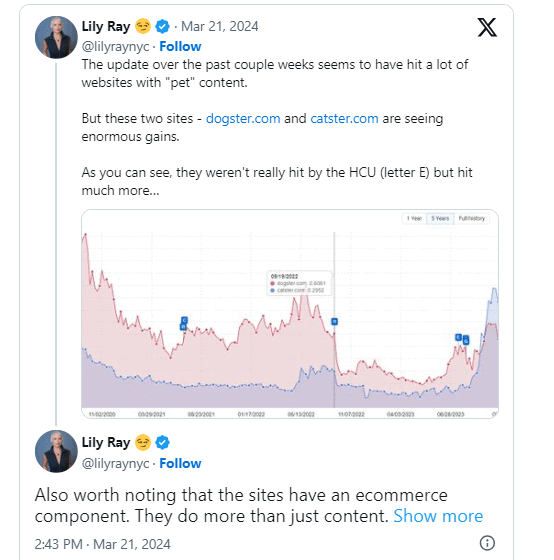
The conversation transitioned to exploring potential “overlapping signals” between websites affected by the Reviews system and the Helpful Content system (HCU), prompting Terry Van Horne to tweet:
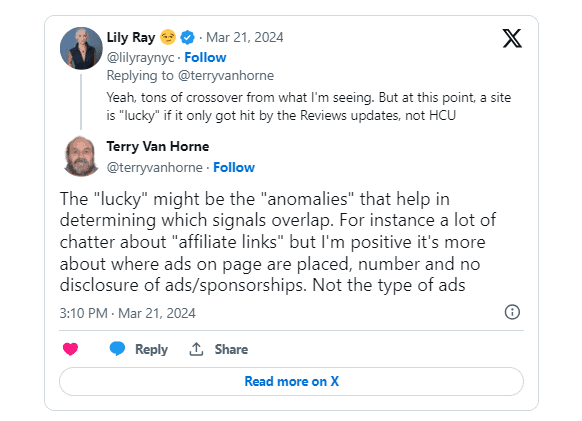
With Lily Ray responding:
“Yeah, tons of crossover from what I’m seeing. But at this point, a site is “lucky” if it only got hit by the Reviews updates, not HCU”
Terry countered by expressing skepticism towards suggestions from others that being an affiliate site could be a contributing factor. He emphasized that the issue wasn’t only related to the type of advertising but rather other underlying factors.
His tweet stated:
“The “lucky” might be the “anomalies” that help in determining which signals overlap. For instance a lot of chatter about “affiliate links” but I’m positive it’s more about where ads on page are placed, number and no disclosure of ads/sponsorships. Not the type of ads”
That’s how the conversation evolved, changing towards a discussion about affiliate sites. In response to the second tweet regarding websites having multiple components, someone chimed in:
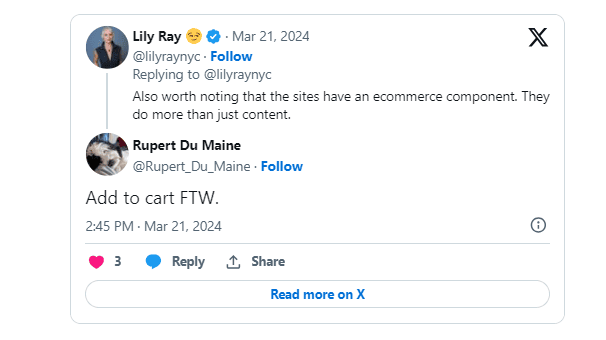
It was the following tweet by Lily Ray that SearchLiaison responded to:
“Yeah… I’m wondering if integrating ecommerce is something that could help many HCU-affected sites recover over time.
I realize this is much easier said than done… but it shows Google that your site does more than just affiliate/review content.”
Lily wasn’t proposing that integrating e-commerce would aid in recovery; she was simply pondering or perhaps brainstorming out loud.
SearchLiaison responded by advising against taking actions only to “impress Google,” emphasizing the importance of prioritizing user intent strategies.
SearchLiaison’s tweet read:
“I wouldn’t recommend people start adding carts because it “shows Google” any more than I would recommend anyone do anything they think “shows Google” something. You want to do things that make sense for your visitors, because what “shows Google” you have a great site is to be … a great site for your visitors not to add things you assume are just for Google.
Also Lily, I don’t mean this toward you in particular or negatively. It’s just shorthand common thinking that so many understandably deal with.
Doing things you think are just for Google is falling behind what our ranking systems are trying to reward rather than being in front of them. Everything I said here: https://twitter.com/searchliaison/status/1725275245571940728“
SearchLiaison further elaborated on the issue of websites attempting to “show” by providing examples of the types of actions that lead to a dead-end by focusing on the wrong priorities.
He elaborated:
“Stop trying to “show Google” things. I have been through so many sites at this point (and I appreciate the feedback), and the patterns are often like this:
– Something saying an “expert” reviewed the content because someone mistakenly believes that ranks them better
– Weird table-of-content things shoved at the top because who knows, along the way, somehow that became a thing I’m guessing people assume ranks you better
– The page has been updated within a few days, or even is fresh on the exact day, even though the content isn’t particularly needing anything fresh and probably someone did some really light rewrite and fresh date because they think that “shows Google” you have fresh content and will rank better.
– The page end with a series of “hey, here are some frequently asked questions” because someone used a tool or other method to just add things they think people search for specifically because they heard if you add a bunch of popular searches to the page, that ranks you better not because anyone coming to your page wants that
– I can barely read through the main content of pages because I keep getting interrupted by things shoved in the middle of it. Which isn’t so much a “show Google” think as much as it is just an unsatisfying experience”
He recognized the imperfections within Google’s algorithms and acknowledged the existence of several top-ranking sites that engage in practices he advised against.
SearchLiaison emphasized that if an SEO practitioner engages in certain practices only because they believe those practices align with what Google’s algorithms seek or because they perceive them as signals of quality, they are misguided and at a dead-end. The primary focus should always be on whether a practice benefits the user, rather than whether it aligns with specific signals Google may be seeking.
He clarified:
“And yes. A million times yes. You will find pages that are still ranking, both from big sites and small sites, that do these things. Because our ranking systems aren’t perfect, and after this current update, we’ll continue to keep working at it, which I also covered before: https://twitter.com/searchliaison/status/1725275270943293459
And I very much hope our guidance will get better to help people understand that what Google wants is what people want. “
Google’s failure to effectively communicate through its documentation was cited by SearchLiaison as the root cause if SEOs were advocating for the addition of details such as being reviewed by an “expert” and similar practices.
Additionally, he provided a glimpse into what the current draft document entails.
He stated:
“I’m pushing for us to have an entire new help page that maybe makes this point better. Part of the current draft says things like:
“The most important key to success with Google Search is to have content that’s meant to please people, rather than to be whatever you might have heard that ‘Google wants.’ For example, people sometimes write content longer than is helpful to their readers because they’ve heard somewhere that ‘Google wants’ long content.
What Google wants is content that people will like, content that your own readers and visitors find helpful and satisfying. This is the foundation of your potential success with Google. Any question you have about making content for Google will come back to this principle. ‘Is this content that my visitors would find satisfying?’ If the answer is yes, then do that, because that’s what Google wants.”
SearchLiaison emphasized his role as a liaison between Google search and its users, clarifying that he is not directly involved in Google search operations.
Google on Spammy Backlinks and Their Adverse Effect on Rankings
He reiterated his plea for the search marketing community to refrain from fixating on trying to decipher what they believe Google’s algorithm favors and then tailoring their strategies accordingly. Although not explicitly stated, this likely encompasses scrutinizing the Search Quality Rater Guidelines for actionable insights.
Instead, he stressed the importance of prioritizing site visitor feedback, which consists of both explicit feedback (where visitors express their opinions) and implicit feedback (where analytics tools like Clarity reveal visitor sentiments through user interaction signals).
In essence, focusing on user feedback is consistently more beneficial than attempting to cater to perceived algorithmic preferences.
SearchLiaison continued:
“Those providing quality experiences, I personally want you to succeed.
But please. If you want to succeed, stop doing a lot of the things you’ve heard second, third, whatever that are supposed to “show Google” something and show your visitors a great, satisfying experience. That’s how you show Google’s ranking systems that you should do well.”
Would you like to read more about “Guidance from Google on Ranking” related articles? If so, we invite you to take a look at our other tech topics before you leave!
Use our Internet marketing service to help you rank on the first page of SERP.
![]()









